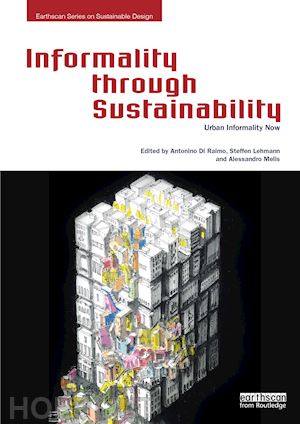Preface David Turnbull Introduction Antonino Di Raimo, Steffen Lehmann and Alessandro Melis Part 1 Part1. Introduction -What does Informality have to say to Architecture?: Decolonising the Enquire and the Enquirer Antonino Di Raimo Chapter 1. Visualizing the Political: Teddy Cruz and Fonna Forman, in conversation with Kathy Waghorn Teddy Cruz and Fonna Forman, in conversation with Kathy Waghorn Chapter 2. From a Marxist Arcadia to High-tech Favelas: The Latency of Informality in Archizoom and Andrea Branzi Pablo Martínez Capdevila Chapter 3. "I’m an imposter" [a Gödel-Cassandra incompleteness] François Roche - New-Territories Chapter 4. Informalityand Dissent: The Culture of Self-sufficiency of the American Rural Poor David Franco Santa Cruz Chapter 5. The Urbanism of Individual Arrangements: Understanding Specific Realities - The Case of Tirana Sotir Dhamo Chapter 6. Informality and Temporary Appropriation in Atlanta as a Prototype for Resilient Communities William Carpenter Chapter 7. Effected Butterflies: Informal Urban Migration of Monarchs and Humans Across the US-Mexico Border Mitchell Joachim and Nicholas Gervasi Chapter 8. Informality and Commons Simone Sfriso, Massimo Lepore, Raul Pantaleo, Barbora Foerster Part 2 Part2. Introduction - Informality as a Mode of Sustainability Steffen Lehmann Chapter 9. The Self-Organising City and Its Modus Operandi: Informal Urbanism and Public Space Steffen Lehmann Chapter 10. Housing the Majority, Destroying Agrarian Land: The Irreconcilable Dilemma of Cairo’s Informal areas Charlotte Malterre-Barthes Chapter 11. Informality and Mass Housing in Seoul: The Role of Informal Settlements in the Formation of Megaprojects Dario Pedrabissi Chapter 12. The Role of Adaptation in Changing the Micro-Morphology of Informal Settlements Paul Jones Chapter 13. Urban (in)formality and the New Unsustainable Landscape of the Global South: Case Study of Megacity Dhaka Mohammad S,H, Swapan, Atiq Zaman and Steffen Lehmann Chapter 14. Landscape - Infrastructure: Formal - informal Entanglements across Political Ecologies of Resource Use Daniela Perrotti Chapter 15. ‘AQUI ESTAMOS Y NO NOS VAMOS’: Contested Ground, Sustainable Informal Settlement and Human Consequence in the Urban Landscape of South Los Angeles Danny H. Ortega Chapter 16. The Hill and the Asphalt: a 50-year Perspective on Informality in Rio de Janeiro Janice Perlman Part 3. Part3. Introduction - Informal Behavior as a Form of Community Resilience Alessandro Melis Chapter 17. Informal Microclimates: Study on Self-Built Settlements and Human Comfort in Amman Ata Chokhachian, Daniele Santucci, Thomas Auer Chapter 18. Urban Form of Informal Settlements in the Western Balkans Dorina Pojani Chapter 19. Understanding Temporary Appropriation and the Streetscape Design: The case of Algiers, Auckland and Mexico City J. Antonio Lara- Hernandez, M. Yazid Khemri and Alessandro Melis Chapter 20. Reinventing City Planningina Contextthat "Hates" Planning!: A New Role for Architects, City Planners, and Institutions Besnik Aliaj Chapter 21. Roman Lessons: What if Informality was not a bug to be Corrected but a Bacterium Capable of Reactivating a Dormant Urban Metabolism? Alessandra Lai and Francesco Careri Chapter 22. Informality in Formality: The Case of a Neighbourhood in a Nigerian City Olufunto, Ayoola, Melis Chapter 23. Achieving Community Resilience through Informal Urban Practices: The Case of El Houma in Algiers Yazid Khemri and Alessandro Melis Chapter 24. Learning Place Attachment from the Informal City Cristina Dreifuss Chapter 25. Designing the "Off-Grid" City: Empowering the Transactions of Infrastructure Aseem Inam Index












